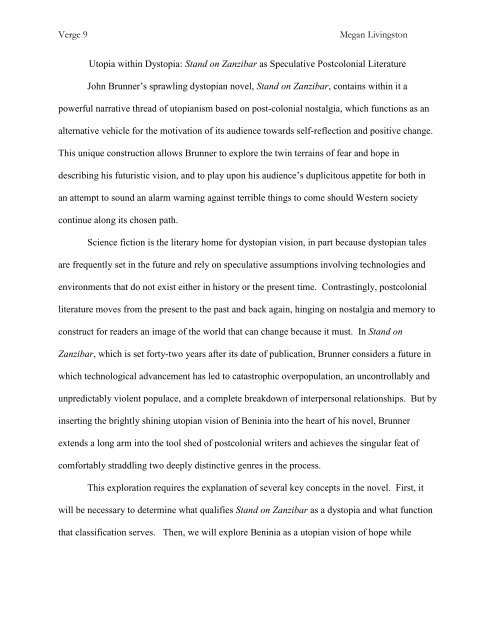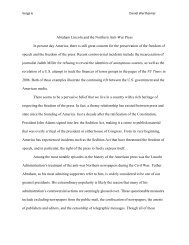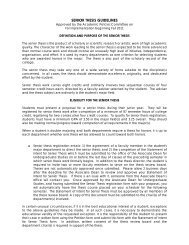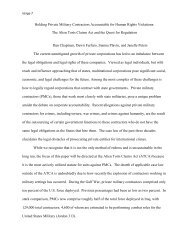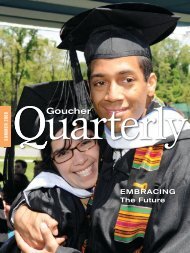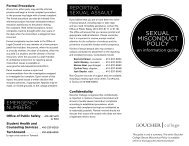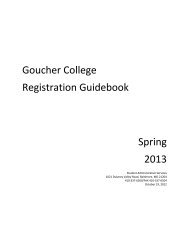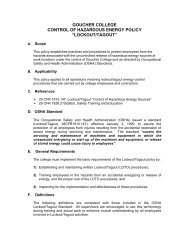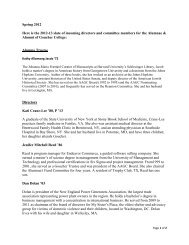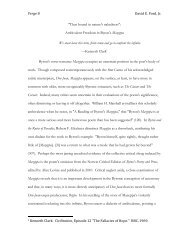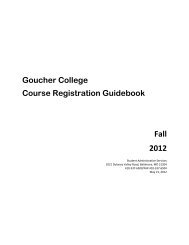Stand on Zanzibar as Speculative Postcolonial Literature
Stand on Zanzibar as Speculative Postcolonial Literature
Stand on Zanzibar as Speculative Postcolonial Literature
You also want an ePaper? Increase the reach of your titles
YUMPU automatically turns print PDFs into web optimized ePapers that Google loves.
Verge 9<br />
Megan Livingst<strong>on</strong><br />
Utopia within Dystopia: <str<strong>on</strong>g>Stand</str<strong>on</strong>g> <strong>on</strong> <strong>Zanzibar</strong> <strong>as</strong> <strong>Speculative</strong> Postcol<strong>on</strong>ial <strong>Literature</strong><br />
John Brunner‘s sprawling dystopian novel, <str<strong>on</strong>g>Stand</str<strong>on</strong>g> <strong>on</strong> <strong>Zanzibar</strong>, c<strong>on</strong>tains within it a<br />
powerful narrative thread of utopianism b<strong>as</strong>ed <strong>on</strong> post-col<strong>on</strong>ial nostalgia, which functi<strong>on</strong>s <strong>as</strong> an<br />
alternative vehicle for the motivati<strong>on</strong> of its audience towards self-reflecti<strong>on</strong> and positive change.<br />
This unique c<strong>on</strong>structi<strong>on</strong> allows Brunner to explore the twin terrains of fear and hope in<br />
describing his futuristic visi<strong>on</strong>, and to play up<strong>on</strong> his audience‘s duplicitous appetite for both in<br />
an attempt to sound an alarm warning against terrible things to come should Western society<br />
c<strong>on</strong>tinue al<strong>on</strong>g its chosen path.<br />
Science ficti<strong>on</strong> is the literary home for dystopian visi<strong>on</strong>, in part because dystopian tales<br />
are frequently set in the future and rely <strong>on</strong> speculative <strong>as</strong>sumpti<strong>on</strong>s involving technologies and<br />
envir<strong>on</strong>ments that do not exist either in history or the present time. C<strong>on</strong>tr<strong>as</strong>tingly, postcol<strong>on</strong>ial<br />
literature moves from the present to the p<strong>as</strong>t and back again, hinging <strong>on</strong> nostalgia and memory to<br />
c<strong>on</strong>struct for readers an image of the world that can change because it must. In <str<strong>on</strong>g>Stand</str<strong>on</strong>g> <strong>on</strong><br />
<strong>Zanzibar</strong>, which is set forty-two years after its date of publicati<strong>on</strong>, Brunner c<strong>on</strong>siders a future in<br />
which technological advancement h<strong>as</strong> led to cat<strong>as</strong>trophic overpopulati<strong>on</strong>, an unc<strong>on</strong>trollably and<br />
unpredictably violent populace, and a complete breakdown of interpers<strong>on</strong>al relati<strong>on</strong>ships. But by<br />
inserting the brightly shining utopian visi<strong>on</strong> of Beninia into the heart of his novel, Brunner<br />
extends a l<strong>on</strong>g arm into the tool shed of postcol<strong>on</strong>ial writers and achieves the singular feat of<br />
comfortably straddling two deeply distinctive genres in the process.<br />
This explorati<strong>on</strong> requires the explanati<strong>on</strong> of several key c<strong>on</strong>cepts in the novel. First, it<br />
will be necessary to determine what qualifies <str<strong>on</strong>g>Stand</str<strong>on</strong>g> <strong>on</strong> <strong>Zanzibar</strong> <strong>as</strong> a dystopia and what functi<strong>on</strong><br />
that cl<strong>as</strong>sificati<strong>on</strong> serves. Then, we will explore Beninia <strong>as</strong> a utopian visi<strong>on</strong> of hope while
Livingst<strong>on</strong> 2<br />
placing hope within a postcol<strong>on</strong>ial c<strong>on</strong>text. Finally, we will draw <strong>on</strong> specific examples in the<br />
text to locate the novel within the genre of postcol<strong>on</strong>ial literature.<br />
John Hickman describes dystopian ficti<strong>on</strong> <strong>as</strong> a creative vehicle offering ―the most direct<br />
means to denounce the social evils that authors perceive emerging in c<strong>on</strong>temporary society‖ and<br />
lists am<strong>on</strong>g the functi<strong>on</strong>s of science ficti<strong>on</strong> in general, ―[helping] to identify the possible<br />
c<strong>on</strong>sequences that might flow from pers<strong>on</strong>al and public policy choices, especially those<br />
involving new technology‖ (141-142). Brunner‘s created universe in <str<strong>on</strong>g>Stand</str<strong>on</strong>g> <strong>on</strong> <strong>Zanzibar</strong> features<br />
a society at the mercy of a probability-predicting super-computer, which leads humanity al<strong>on</strong>g its<br />
descent into an array of dire and destructive c<strong>on</strong>sequences stemming from state and corporate<br />
policy decisi<strong>on</strong>s. The most obvious of these is the intrusive eugenics legislati<strong>on</strong> imposed up<strong>on</strong><br />
the citizens of all the developed nati<strong>on</strong>s in the story, deemed necessary by governments seeking<br />
to curb populati<strong>on</strong> growth and purge the populace of genetically undesirable traits. Brunner<br />
seems to be reacting to a n<strong>as</strong>cent trend towards superficiality and overc<strong>on</strong>sumpti<strong>on</strong> in his own<br />
time. He intuitively c<strong>on</strong>nects advances in medicine and science with a l<strong>on</strong>g-standing human<br />
desire for immortality, and predicts the commoditizati<strong>on</strong> of health and l<strong>on</strong>gevity al<strong>on</strong>g with it.<br />
Similarly, Brunner invents ―muckers,‖ ordinary men and women who suffer temporary<br />
insanity which pushes them to commit horrifying acts of violence against any<strong>on</strong>e unlucky<br />
enough to be near them. Chad Mulligan, the sociologist whose voice serves <strong>as</strong> a representati<strong>on</strong><br />
of the author‘s throughout the text, identifies the mucker phenomen<strong>on</strong> <strong>as</strong> a result of<br />
overcrowding and the loss of any sense of self or pers<strong>on</strong>al space, comparing life in the densely<br />
populated cities to being in a jail cell, where<br />
[the] bars are the competing members of your own species, at le<strong>as</strong>t <strong>as</strong> cunning <strong>as</strong><br />
you <strong>on</strong> average, forever shifting around so you can‘t pin them down, liable
Livingst<strong>on</strong> 3<br />
to get in your way without the le<strong>as</strong>t warning, disorienting your pers<strong>on</strong>al<br />
envir<strong>on</strong>ment until you want to grab a gun or an axe and turn mucker.<br />
(Brunner 67)<br />
These terrifying realities in Brunner‘s visi<strong>on</strong> squarely place the work in the realm of dystopian<br />
ficti<strong>on</strong>, first by hinting at what may have g<strong>on</strong>e wr<strong>on</strong>g in the p<strong>as</strong>t to yield such a future. Then,<br />
Brunner draws <strong>on</strong> what Rob McAlear defines <strong>as</strong> the rhetoric of fear to offer a persu<strong>as</strong>ive<br />
argument for making whatever changes are necessary to remove the possibility of such a future<br />
ever arising (24).<br />
This appeal to the reader‘s sense of fear implies a relati<strong>on</strong>ship between the author and his<br />
audience that is pivotal to understanding dystopian ficti<strong>on</strong> <strong>as</strong> a genre. McAlear suggests that<br />
dystopi<strong>as</strong> use the moral code of a particular society to turn the focus of individuals inward,<br />
where they can become enlightened enough to see that the steps they take at any given moment<br />
do, indeed, lead somewhere, and that where they lead may not be good for society <strong>as</strong> a whole<br />
(26). Chad Mulligan, c<strong>on</strong>tinuing his musings <strong>on</strong> the debauched state of the modern Western<br />
global citizen, appears to be the willing, if at times reluctant, harbinger of fear, promising little<br />
else but a nightmare for the slowly awakening reader: ―Your life from birth to death resembles<br />
the progress of a hopelessly drunk tightrope walker whose act h<strong>as</strong> been so bad up til now that<br />
he‘s being bombarded with rotten eggs and broken bottles‖ (Brunner 67).<br />
According to McAlear, the strategic functi<strong>on</strong> of fear in dystopian visi<strong>on</strong> is mirrored by<br />
the similarly strategic functi<strong>on</strong> of hope in utopian visi<strong>on</strong> (25). In <str<strong>on</strong>g>Stand</str<strong>on</strong>g> <strong>on</strong> <strong>Zanzibar</strong>, there is an<br />
anomaly that defies every principle of fear presented by the larger dystopian visi<strong>on</strong>. This<br />
aberrati<strong>on</strong> takes the form of the African nati<strong>on</strong> of Beninia, a state without a hierarchical<br />
bureaucratic structure that preys <strong>on</strong> or imposes itself <strong>on</strong> its citizens, but is instead governed <strong>as</strong> a
Livingst<strong>on</strong> 4<br />
family, with its president <strong>as</strong> the proud patriarch with his arms around each and every <strong>on</strong>e of his<br />
children, the citizens of his nati<strong>on</strong>. Although it is a poor country, it does not suffer from c<strong>on</strong>flict,<br />
oppressi<strong>on</strong> and war; although it is not a rich country, it enjoys great wealth in the human capital<br />
of comp<strong>as</strong>si<strong>on</strong> and communi<strong>on</strong>. At first glance, Beninia fits a kind of textbook definiti<strong>on</strong> of a<br />
utopia, <strong>as</strong> a geographical locale, where everything – though not perfect – is <strong>as</strong> it should be. If the<br />
novel <strong>as</strong> a whole functi<strong>on</strong>s <strong>as</strong> a dystopia because of violence, murder, mayhem and muckers,<br />
then Beninia functi<strong>on</strong>s <strong>as</strong> a utopia within it because,<br />
there aren‘t any murders, there aren‘t any muckers, there aren‘t any tempers<br />
lost, there aren‘t any tribal squabbles, there aren‘t any riots, there‘s nothing<br />
of what people in supposedly more fortunate countries have come to take<br />
for granted.‖ (Brunner 428)<br />
Beninia is a pillar of hope, reaching up from the depths of a fearful planet. But Bill Ashcroft<br />
makes an important distincti<strong>on</strong> between the c<strong>on</strong>cept of utopia and a theory of utopianism,<br />
shifting the focus from an actual, idyllic locati<strong>on</strong> to a larger, more ambiguous realm, where ―the<br />
spirit of hope itself‖ communicates the ―essence of desire for a better world‖ (8). A utopia is a<br />
place people can dream of visiting; utopianism reflects the possibility of metaphysical<br />
transformati<strong>on</strong> and realignment b<strong>as</strong>ed <strong>on</strong> a liberating ideology (13). Beninia is not just a place<br />
where many of Brunner‘s characters go; it is also an idea that changes each pers<strong>on</strong> who tries to<br />
resist it.<br />
Ashcroft defines utopia <strong>as</strong> a future c<strong>on</strong>struct, and indicates that implicit within<br />
utopianism is an ―operati<strong>on</strong> of memory,‖ which functi<strong>on</strong>s <strong>as</strong> a bridge between the present and the<br />
p<strong>as</strong>t (9). And yet, even with this distincti<strong>on</strong>, it seems obvious that Beninia still fits within the<br />
definiti<strong>on</strong> of a cl<strong>as</strong>sic utopia: the novel is, after all, set in the future and is still well within the
Livingst<strong>on</strong> 5<br />
realm of science ficti<strong>on</strong>. But Ashcroft c<strong>on</strong>tinues, using the c<strong>on</strong>cept of memory to place<br />
utopianism in a postcol<strong>on</strong>ial c<strong>on</strong>text by <strong>as</strong>serting its usefulness, not <strong>as</strong> a glimpse into the p<strong>as</strong>t,<br />
but <strong>as</strong> a glimpse into the very present worlds of what people want and need to see in their<br />
history, and how what they see can lead them towards the future. Brunner‘s Beninia, although<br />
presented in a novel set in the future, is a representati<strong>on</strong> of the very real present for the characters<br />
in the novel. Nowhere is this clearer than in the stories of Begi, introduced <strong>as</strong> a Beninian<br />
counterpart to Jesus Christ. Many tales surrounding the life of Begi are relayed throughout the<br />
story, but in <strong>on</strong>e secti<strong>on</strong>, Brunner makes the curious choice to show how the mythology<br />
surrounding Begi is not <strong>on</strong>ly <strong>on</strong>going, but evolving al<strong>on</strong>g with the story. After the General<br />
Technics operati<strong>on</strong>s in Beninia begin and the corporate element is physically introduced to the<br />
country, Brunner slyly reports, ―There is a new Begi story. Nobody knows where it got started.<br />
It‘s called Begi and the American‖ (430). What in utopia is a simple leap into the future<br />
becomes in utopianism a cyclical journey through time, tethered to history, and hope; reflecti<strong>on</strong><br />
and anticipati<strong>on</strong>.<br />
Ashcroft cites the ―Myth of Return‖ <strong>as</strong> a dominant theme in postcol<strong>on</strong>ial utopianism,<br />
describing ―its most extreme form… <strong>as</strong> the desire to retrieve some essential authentic cultural<br />
identity that existed before col<strong>on</strong>isati<strong>on</strong> happened‖ (10). Brunner, writing in Great Britain in<br />
1968, <strong>on</strong> the heels of the c<strong>as</strong>cading revoluti<strong>on</strong>s for independence throughout Africa, would<br />
almost certainly have been aware of at le<strong>as</strong>t <strong>on</strong>e side of this phenomen<strong>on</strong>. Brunner, presenting<br />
the European viewpoint, chooses two couples with opposing yet mirrored motives for seeking to<br />
enter Africa through the window opened by American corporate interests. Victor and Mary<br />
Whatmough are a married pair of British ex-col<strong>on</strong>izers, who l<strong>on</strong>g to return to the glory of true,<br />
material superiority, in which subjugated people are <strong>on</strong>ly <strong>as</strong> valuable <strong>as</strong> they are capable of
Livingst<strong>on</strong> 6<br />
service and are so devoid of value <strong>as</strong> to be instantly replaceable. Living lives of incre<strong>as</strong>ing<br />
disappointment in England, the idea of returning to Africa becomes an obsessi<strong>on</strong>; for Victor, it<br />
becomes an ultimatum, which eventually leads him to suicide when that possibility is finally lost<br />
forever (509).<br />
Jeannine and Pierre Clodard are French nati<strong>on</strong>als engaged in an unusually close sibling<br />
relati<strong>on</strong>ship whose parents, though evicted from Algeria during its struggle for independence<br />
before having children, instilled in those children a powerful l<strong>on</strong>ging for a homeland they would<br />
never see. Jeannine, sharing a wistful moment with her brother over the Africa-shaped<br />
emptiness that persists within them, laments, ―We‘re not expatriates… We‘re extemporates,<br />
exiled from a country that vanished even before we were born, of which our parents made us<br />
citizens without intending to‖ (Brunner 260). For this pair, <strong>as</strong> well <strong>as</strong> for the Whatmoughs, the<br />
news that they will not be going to Beninia prompts the crossing of a line from which there is no<br />
return. The Clodards, however, do not cross over the threshold between life and death, but rather<br />
push their emoti<strong>on</strong>ally incestuous relati<strong>on</strong>ship into the physical, sexual realm (518).<br />
Key to the c<strong>on</strong>cept of the myth of return is the functi<strong>on</strong> of nostalgia within postcol<strong>on</strong>ial<br />
literature. Dennis Walder defines nostalgia <strong>as</strong> ―a cultural phenomen<strong>on</strong> that… c<strong>on</strong>nects people<br />
across nati<strong>on</strong>al and historical <strong>as</strong> well <strong>as</strong> pers<strong>on</strong>al boundaries‖ (935). Certainly, the anathema <strong>on</strong><br />
display in the indecent b<strong>on</strong>d between Jeannine and Pierre, b<strong>as</strong>ed solely <strong>on</strong> the perceived noti<strong>on</strong><br />
that each of them is the <strong>on</strong>ly other pers<strong>on</strong> who can understand who they are and why they are, is<br />
explained within this c<strong>on</strong>text. Svetlana Boym, writing about nostalgia, delineates two types of<br />
nostalgi<strong>as</strong>: the restorative, which c<strong>on</strong>cerns nati<strong>on</strong>alism and myth-making in an effort to rec<strong>on</strong>struct<br />
something that, although lost, remains true in the eye of the beholder; and the<br />
reflective, which hovers beneath the weight of loss and l<strong>on</strong>ging, and lives am<strong>on</strong>g dreams and
Livingst<strong>on</strong> 7<br />
wishes (41). Both are represented in <str<strong>on</strong>g>Stand</str<strong>on</strong>g> <strong>on</strong> <strong>Zanzibar</strong>, and both are essential to understanding<br />
the novel <strong>as</strong> a work of postcol<strong>on</strong>ial ficti<strong>on</strong>.<br />
In order to arrive at this understanding, it is important to define the word postcol<strong>on</strong>ial.<br />
Dennis Walder brings the term into sharper focus, using it to ―identify a range of experiences and<br />
representati<strong>on</strong>s produced by intercultural and transnati<strong>on</strong>al c<strong>on</strong>flict, migrati<strong>on</strong>, and enforced<br />
settlement‖ (936). Here is where the two l<strong>on</strong>ging pairs of European ex-col<strong>on</strong>izers (and would-be<br />
col<strong>on</strong>izers) are joined by several other characters in a dance between c<strong>on</strong>structed memory and<br />
transformative hope. Brunner, having ingeniously predicted the widespread globalizati<strong>on</strong> that<br />
h<strong>as</strong> come to define the twenty-first century, introduces a number of characters who are affected<br />
by these kinds of experiences and representati<strong>on</strong>s.<br />
The European exiles exemplify Boym‘s paradigm of restorative nostalgia, but when<br />
addressing the issue of the reflective, we can pluck from the central characters of the novel<br />
freely. Part of what makes reflective nostalgia reflective is the ―[qualifying] awareness that the<br />
p<strong>as</strong>t cannot be restored‖ and ―is approachable through ‗stories and secrets‘‖ (Walder 940). This<br />
brings to mind Brunner‘s Norman House, the African-American, or Afram, General Technics<br />
Junior Vice President who undergoes an unsettling transformati<strong>on</strong> that leads him to become the<br />
head of the company‘s operati<strong>on</strong>s in Beninia. Early in the novel, Norman recalls a memory<br />
p<strong>as</strong>sed down to him by his grandfather of his family‘s slave p<strong>as</strong>t, and specifically of the violent,<br />
brutal punishment of an ancestor after an act of insubordinati<strong>on</strong>. That this memory is not a<br />
ple<strong>as</strong>ant <strong>on</strong>e does nothing to dim the power of it; Norman recalls the memory because he is<br />
forced to reenact it, shamefully c<strong>as</strong>t in the role of the oppressor. What is important here is that it<br />
places Norman within an African c<strong>on</strong>text, l<strong>on</strong>g before he sets foot in Beninia. It opens a need<br />
within him, to relate to a part of himself he h<strong>as</strong> subdued; first, he approaches Elihu M<strong>as</strong>ters,
Livingst<strong>on</strong> 8<br />
American amb<strong>as</strong>sador to Beninia and another Afram who will ultimately become his guide <strong>on</strong><br />
his journey back to himself through Africa. When he arrives in Beninia, he is told by Gide<strong>on</strong>,<br />
another Afram expatriate working at the American Emb<strong>as</strong>sy, that the country will ―digest‖ him<br />
(Brunner 342). What Gide<strong>on</strong> does not say is that Norman, al<strong>on</strong>g with many others, will also<br />
digest Beninia.<br />
The America in John Brunner‘s visi<strong>on</strong> of 2010, from a postcol<strong>on</strong>ial perspective, is not<br />
much different from the America of 2012. African-descended Americans do lose their sense of<br />
self <strong>as</strong> they stretch and bend into <strong>as</strong>similating postures. In the novel, it is first Elihu, then<br />
Gide<strong>on</strong>, then Norman; all fall to the myth of return that for them, <strong>as</strong> descendants of slaves,<br />
predates col<strong>on</strong>ialism and the postcol<strong>on</strong>ial period. Norman, offering an impromptu and<br />
imp<strong>as</strong>si<strong>on</strong>ed compliment to Beninia‘s leader, President Obomi, breaks from professi<strong>on</strong>alism and<br />
speaks pers<strong>on</strong>ally:<br />
But what I wind up thinking is—is that I half-wish the slave-traders<br />
hadn‘t steered clear of Beninia. Because I‘d be rather proud to think<br />
my own African ancestors came from Shinka stock. (428)<br />
Perhaps most interesting about this is Norman‘s observati<strong>on</strong> of the resp<strong>on</strong>se of his team of<br />
colleagues to his statement, <strong>on</strong>e of whom, a white man, ―w<strong>as</strong> apparently nodding violent<br />
agreement, not a reacti<strong>on</strong> <strong>on</strong>e would expect from a Cauc<strong>as</strong>ian in Beninia.‖ Eventually, even<br />
Chad Mulligan, the meta-John Brunner within the novel who denounces all products of the m<strong>as</strong>smarketed,<br />
unfettered capitalistic society – including himself – goes to Beninia and becomes a<br />
new-Beninian. So any<strong>on</strong>e and every<strong>on</strong>e of any and every phenotype, is susceptible to the<br />
powerful pull of postcol<strong>on</strong>ial or, in Beninia‘s c<strong>as</strong>e, anti-col<strong>on</strong>ial Africa and its infectious,<br />
irresistible bel<strong>on</strong>gingness. And in this globalized, dystopian visi<strong>on</strong> where people are forced to
Livingst<strong>on</strong> 9<br />
undergo sterilizati<strong>on</strong> or exile, where neighbors murder their neighbors out of jealousy or<br />
boredom or rage, where women are forced to abort their children or be impris<strong>on</strong>ed, where<br />
homelessness requires a permit, and where siblings can be born l<strong>on</strong>ging for a home in a foreign<br />
land, every<strong>on</strong>e is an expatriate, and every<strong>on</strong>e is col<strong>on</strong>ized. And if every<strong>on</strong>e is col<strong>on</strong>ized, then<br />
every<strong>on</strong>e is equally available to break their b<strong>on</strong>ds and be freed. Walder notes, ―Although we<br />
may find it e<strong>as</strong>y in nostalgic retrospect to identify friend and foe, oppressor and oppressed, <strong>on</strong><br />
closer inspecti<strong>on</strong> we may find it less e<strong>as</strong>y‖ (937). Brunner even goes so far <strong>as</strong> to invent a genetic<br />
marker within the lineage of the Shinka people, which holds the promise of a return to humanity<br />
for the depraved inhabitants of his dystopia. Beninia is where they all must go to decol<strong>on</strong>ize.<br />
Beninia is where they all go to de-eptify. D<strong>on</strong>ald Hogan Mark II, in exile from himself and his<br />
home <strong>as</strong> an unwilling but c<strong>on</strong>trolled government agent in Yatakang, muses over the promise of<br />
the genetic optimizati<strong>on</strong> program, even <strong>as</strong> that promise threatens to further destabilize the nati<strong>on</strong>s<br />
of the world:<br />
Somehow, the entire human race seemed momentarily united in a single<br />
entrancing dream—the hope that the next generati<strong>on</strong> they would bequeath<br />
to Mother Earth would be whole, healthy, sane, capable of making amends<br />
for the rape they had inflicted in olden days. (358)<br />
What D<strong>on</strong>ald does not yet know is that so<strong>on</strong>, after he is driven to kill and kill again, and <strong>on</strong>ce he<br />
is broken, demilitarized, and drugged into compliance, he will find himself within reach of this<br />
dream, thanks to the utopian specter of Beninia.<br />
John Brunner, in choosing to inject his dystopian epic with a l<strong>as</strong>ting, pungent breath of<br />
hope, tilts its trajectory through the science ficti<strong>on</strong> genre and into the multi-t<strong>on</strong>gued world of<br />
postcol<strong>on</strong>ial literature. For all the brutal and senseless deaths and for each exploitative or cruel
Livingst<strong>on</strong> 10<br />
act, Brunner sends <strong>on</strong>e tiny ray of light to illuminate a path out of the darkness. Perhaps, <strong>as</strong> Bill<br />
Ashcroft <strong>as</strong>serts, it is true that ―all achieved utopi<strong>as</strong> are degenerate‖; we are lucky, then, that<br />
Brunner‘s Beninia exists in a ficti<strong>on</strong>al universe where it does not and cannot rule or overwhelm<br />
us (9). It <strong>on</strong>ly persists. It merely digests. Nestled within the c<strong>on</strong>cept of possibility is the<br />
promise that what we cannot know might still be; Ashcroft c<strong>on</strong>siders utopianism ―fundamental to<br />
human c<strong>on</strong>sciousness because humans are always striving forward, anticipating, desiring‖ (9).<br />
Depicting complex creatures who readily admit to a t<strong>as</strong>te for carrots while secretly sporting a<br />
sadom<strong>as</strong>ochistic urge for a stick, what Brunner seems to be sure of <strong>as</strong> he offers Beninia up into<br />
the fire-streaked skies, is that without hope, even fear will eventually become a bore. And what<br />
bores us can never hope to free us, because we are curious creatures, destined to follow the<br />
twisted paths we invent, c<strong>on</strong>structing and dec<strong>on</strong>structing ourselves—and our envir<strong>on</strong>ments al<strong>on</strong>g<br />
the way.<br />
Works Cited<br />
Ashcroft, Bill. ―The Ambiguous Necessity of Utopia: Post-Col<strong>on</strong>ial <strong>Literature</strong>s and The<br />
Persistence Of Hope.‖ Social Alternatives 28.3 (2009): 8-14. Academic Search Premier.<br />
Web. 26 Feb. 2012.<br />
Boym, Svetlana. The Future of Nostalgia. New York: B<strong>as</strong>ic Books, 2001. Print.<br />
Brunner, John. <str<strong>on</strong>g>Stand</str<strong>on</strong>g> <strong>on</strong> <strong>Zanzibar</strong>. 1968. New York: Tom Doherty Associates, 2011. Print.
Livingst<strong>on</strong> 11<br />
Hickman, John. ―When Science Ficti<strong>on</strong> Writers Used Ficti<strong>on</strong>al Drugs: Rise and Fall of the<br />
Twentieth-Century Drug Dystopia.‖ Utopian Studies 20.1 (2009): 141-170. Academic<br />
Search Premier. Web. 26 Feb. 2012.<br />
McAlear, Rob. ―The Value Of Fear: Toward A Rhetorical Model of Dystopia.‖ Interdisciplinary<br />
Humanities 27.2 (2010): 24-42. Academic Search Premier. Web. 26 Feb. 2012.<br />
Walder, Dennis. ―Writing, Representati<strong>on</strong>, and Postcol<strong>on</strong>ial Nostalgia.‖ Textual Practice 23.6<br />
(2009): 935-946. Academic Search Premier. Web. 26 Feb. 2012.


